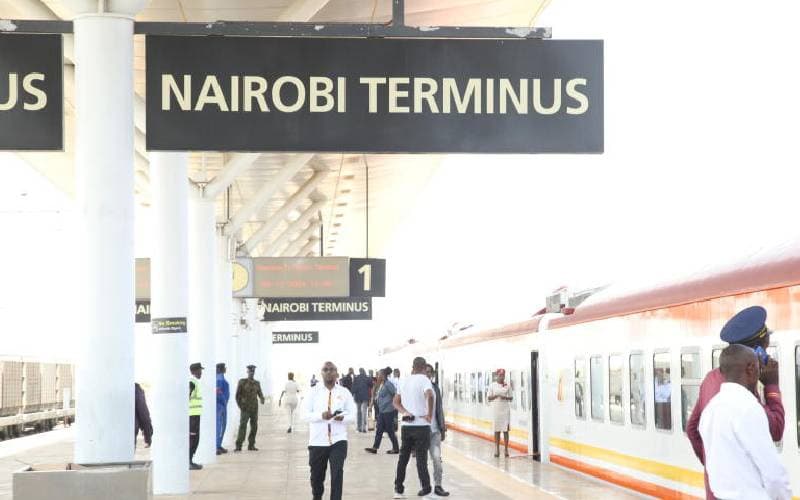We're loading the full news article for you. This includes the article content, images, author information, and related articles.
A damning report by Auditor-General Nancy Gathungu reveals the Kenya Ports Authority unlawfully held onto billions in railway revenue, directly causing Kenya Railways to default on its SGR loan and placing a greater burden on Kenyan taxpayers.

NAIROBI, KENYA - The Kenya Ports Authority (KPA) illegally retained Sh6.2 billion in revenue from the Standard Gauge Railway (SGR), leading directly to the Kenya Railways Corporation (KRC) defaulting on its loan repayments for the multi-billion shilling project. This was a primary finding in a recent report by Auditor-General Nancy Gathungu, presented to the National Assembly's Public Debt and Privatisation Committee on Tuesday, November 4, 2025.
The audit reveals a critical breach of the financial agreements designed to make the SGR project self-sustaining. According to the report, KPA collected Sh22 billion in SGR freight revenue between July 2023 and December 2024. However, it only transferred Sh16 billion to the designated escrow account for the loan repayment, unlawfully holding back Sh6.2 billion. This unilateral decision by KPA starved KRC of the necessary funds to service the massive debt owed to the Exim Bank of China for the railway's construction.
The Auditor-General's report states that this retention is in direct violation of the 'Take or Pay Agreement' dated September 30, 2014. This agreement stipulates that KPA is responsible for collecting all SGR freight charges on behalf of KRC and remitting them to the escrow account, minus a small administrative fee. The audit found that KPA retained the funds to cover potential refund claims and tariff disputes, a provision that does not exist in the governing contract. "This unauthorised revenue retention deprived Kenya Railways of sufficient funds required for loan repayment," Ms. Gathungu's report explicitly states. This action "adversely affected Kenya Railway's financial obligations towards repayment of on-lent loans."
The SGR project, Kenya's largest infrastructure project since independence, was financed by approximately $5.08 billion (Sh656.54 billion) in loans from the China Exim Bank for its first two phases from Mombasa to Naivasha. The failure by KRC to meet its repayment obligations, now directly linked to KPA's actions, has significant consequences for the nation's finances. The total on-lent loan to KRC for the SGR stands at Sh569.3 billion, including principal and accrued interest. When KRC defaults, the National Treasury is forced to step in and service the debt directly from taxpayer funds to avoid a sovereign default. This situation has previously resulted in penalties for default, with Chinese banks fining Kenya Sh1.312 billion in the year ending June 2022 for late payments. The default further strains the national budget, which is already under pressure, potentially leading to increased taxes or budget cuts in other essential sectors to cover the shortfall.
The Auditor-General's report also highlights that the SGR project's financial viability is hampered by its incomplete status. The railway was envisioned to run from Mombasa to Malaba, but as of January 2025, only the Mombasa-Nairobi (Phase 1) and Nairobi-Naivasha (Phase 2a) sections are operational. "The objective of the project... was yet to be fully realised to enable the project to generate sufficient revenue as anticipated in the feasibility studies," the report notes. This lack of full implementation means the railway is not capturing the expected cargo volumes, particularly from neighboring countries, which was a key justification for its construction. Consequently, the revenues generated are insufficient to cover both operational costs and the hefty loan repayments. This revenue shortfall is now critically exacerbated by the illegal retention of funds by KPA, creating a perfect storm for financial distress that ultimately lands at the feet of the Kenyan taxpayer.
The report from the Office of the Auditor-General underscores a significant governance failure between two key state corporations. It raises urgent questions about the oversight of the SGR's complex financial arrangements and the accountability of the KPA's management. The National Assembly's Public Debt and Privatisation Committee is expected to deliberate on the findings and recommend corrective actions to prevent further financial hemorrhaging and protect public funds.
Keep the conversation in one place—threads here stay linked to the story and in the forums.
Sign in to start a discussion
Start a conversation about this story and keep it linked here.
Other hot threads
E-sports and Gaming Community in Kenya
Active 9 months ago
The Role of Technology in Modern Agriculture (AgriTech)
Active 9 months ago
Popular Recreational Activities Across Counties
Active 9 months ago
Investing in Youth Sports Development Programs
Active 9 months ago